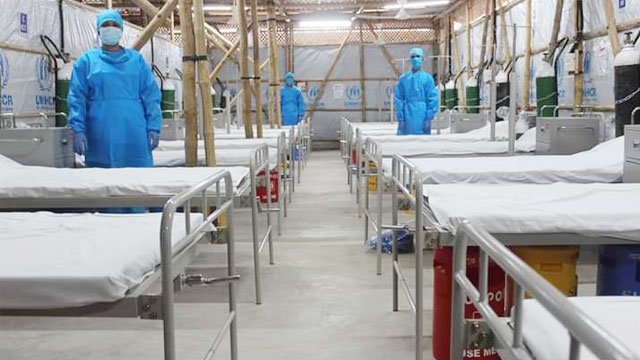The first two Severe Acute Respiratory Infection Isolation and Treatment Centres (SARI ITCs) for Rohingyas and and Bangladeshi communities in Cox’s Bazar have been inaugurated.
These two SARI ITCs, one located within Camp 5 of Kutupalong refugee camp, the second in Ukhiya Upazila, will serve the needs of almost 200 COVID-19 positive patients suffering from moderate to severe symptoms.
UNHCR and the government of Bangladesh, including Deputy Commissioner (DC) Md Kamal Hossain and the Refugee Relief and Repatriation Commissioner (RRRC) Md Mahbub Alam Takluder, as well as partners Relief International, Food for the Hungry, BRAC and WHO, joined the inauguration functions held in Cox's Bazar recently.
“It is a historical moment for us. We have inaugurated this first centre virtually. Right from the beginning of our humanitarian activities, UNHCR has been a pioneer,” said RRRC Talukder.
“From the government side, we are very grateful to UNHCR. In this urgent COVID-19 situation, UNHCR has made this facility which will help many COVID-19 positive patients, both inside and outside of the camps,” said Md Kamal Hossain, Deputy Commissioner of Cox’s Bazar District at the second inauguration ceremony for the 144 bed SARI ITC in Ukhiya.
Senior Operations Manager of UNHCR Cox’s Bazar Hinako Toki said while there are cases in both the camps and the host community, now people have a place to come for isolation and proper treatment, where they can recover and return to their communities.
"This will keep the community safe. This has been a truly collective effort and achievement."
This is part of a broader humanitarian effort by all partners in Cox’s Bazar to provide support to the government of Bangladesh to combat COVID-19, and to ensure capacity to respond to the clinical needs of those with the most severe symptoms, said the UNHCR.
A total of 12 SARI ITCs will be constructed overall, with a capacity of approximately 1,900 beds for refugees and host community.
Additional resources and support, including personal protective equipment (PPE), has already been provided to existing national health care facilities in Cox’s Bazar district as well as to primary health centres within the Rohingya refugee camps.
UNHCR said they will soon complete the preparation of an 18-bed Intensive Care Unit (ICU) in Sadar Hospital, Cox’s Bazar, with 10 ICU beds and 8 high dependency beds, as well as providing staffing, for those with the most severe needs.





